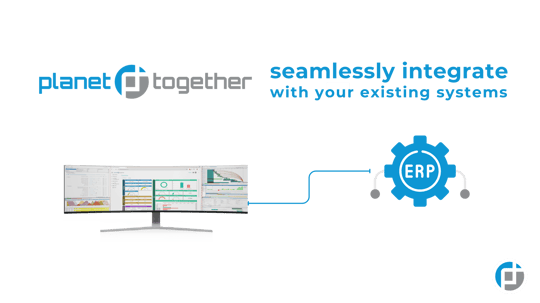Boosting Reliability and Throughput for Dynamic Order Patterns: How Production Schedulers in Pharmaceutical Manufacturing Can Harness APS and ERP Integration
Pharmaceutical manufacturing is one of the most complex and highly regulated industries on the planet. For production schedulers, the challenge isn’t just about keeping lines moving — it’s about balancing regulatory compliance, batch traceability, cold chain requirements, and variable order patterns, all while meeting aggressive delivery timelines.
In today’s volatile market, where sudden spikes in demand, last-minute formulation changes, and unpredictable supply chain disruptions have become the norm, traditional scheduling methods are no longer enough. To remain competitive, pharmaceutical manufacturers must improve both reliability (delivering on time, in full) and throughput (maximizing production efficiency), even when facing dynamic and fast-changing order patterns.
This is where Advanced Planning and Scheduling (APS) systems like PlanetTogether, integrated with robust ERP platforms such as SAP, Oracle, Microsoft Dynamics, Kinaxis, or Aveva, play a transformative role. By creating an agile, data-driven scheduling environment, pharmaceutical plants can shift from reactive firefighting to proactive optimization. Let’s explore how.
The Scheduling Challenge: Dynamic Orders in Pharma
Unlike industries with stable, predictable production runs, pharmaceutical manufacturers often contend with:
Batch production with short lead times
Personalized therapies or custom formulations
High mix/low volume product portfolios
Stringent compliance and documentation needs
Frequent last-minute changes to orders or raw material availability
For production schedulers, this creates constant pressure to adjust plans, rebalance resources, and avoid bottlenecks. Paper-based planning, Excel spreadsheets, or basic ERP scheduling modules can’t deliver the real-time agility required to manage these complexities effectively.
Every time an order changes — whether due to clinical urgency, demand variability, or supply issues — it creates ripple effects across materials, labor, equipment, and delivery promises. Without the right tools, these changes lead to errors, lost throughput, and delayed shipments.

APS + ERP Integration: Building a Smart Scheduling Backbone
An Advanced Planning and Scheduling system like PlanetTogether serves as a powerful layer on top of core ERP platforms such as SAP, Oracle, Microsoft Dynamics, Kinaxis, or Aveva. While the ERP manages transactional data (orders, materials, inventory, quality records), PlanetTogether handles the real-time optimization of schedules, resources, and constraints.
By integrating APS and ERP, pharmaceutical manufacturers gain a seamless flow of data that enables:
Real-time visibility across orders, capacities, inventories, and production constraints
Dynamic rescheduling when priorities shift or disruptions occur
Optimized throughput by aligning production runs, changeovers, and resource allocation
Improved reliability through accurate, achievable delivery commitments
Better collaboration between production, supply chain, and quality teams
In essence, this integration empowers the scheduler to react instantly to change while keeping the broader production system balanced and efficient.
How PlanetTogether Drives Reliability
For pharmaceutical manufacturers, reliability means delivering the right products at the right time, every time. Let’s break down how PlanetTogether improves this:
Constraint-based scheduling: PlanetTogether accounts for critical pharma-specific constraints like batch sizes, cleanroom schedules, material availability, and equipment validations. This reduces the risk of infeasible plans and ensures every schedule produced can actually be executed on the shop floor.
Real-time updates: By pulling live data from ERP systems (like SAP or Oracle), PlanetTogether immediately reflects changes in orders, raw material statuses, or equipment availability. Schedulers no longer work with stale data or disconnected spreadsheets.
Priority management: Dynamic orders often involve shifting priorities — for example, an urgent hospital shipment or a life-saving drug batch may suddenly require top-line focus. PlanetTogether enables schedulers to model “what-if” scenarios and make informed decisions about re-sequencing without jeopardizing other commitments.
Service-level optimization: With integrated APS-ERP, manufacturers can track on-time-in-full (OTIF) metrics and service levels, ensuring that schedules aren’t just optimized for efficiency but also aligned with customer and regulatory expectations.
How PlanetTogether Enhances Throughput
While reliability ensures what you promise is delivered, throughput ensures how much you can produce efficiently. Here’s how PlanetTogether boosts throughput in pharma operations:
Changeover reduction: Frequent changeovers between product types, dosage forms, or packaging lines can drain capacity. PlanetTogether’s advanced algorithms group orders intelligently, minimizing unnecessary changeovers and maximizing productive uptime.
Resource optimization: From cleanroom space to skilled technicians and specialized equipment, PlanetTogether allocates resources based on availability, qualifications, and shift patterns, helping schedulers squeeze more productivity out of constrained environments.
Bottleneck management: By analyzing system-wide capacity, the APS helps identify and address bottlenecks before they escalate — whether it’s a critical piece of equipment or a rate-limiting quality assurance step.
Parallel and overlapping operations: Some pharmaceutical processes can be run in parallel or partially overlapped (such as preparing materials while another batch finishes). PlanetTogether’s scheduling engine leverages these opportunities to speed up production cycles.
The integration between PlanetTogether and leading ERP systems does more than just automate scheduling — it lays the foundation for a predictive, intelligent production environment.
With advanced analytics, AI, and machine learning capabilities increasingly embedded into APS platforms, production schedulers will soon be able to:
Predict capacity shortfalls and material risks before they occur
Optimize schedules for sustainability goals, like energy usage or waste reduction
Simulate long-term production scenarios to support strategic planning
Integrate with digital twins and IoT-enabled shop floors for real-time feedback and continuous improvement
For pharmaceutical manufacturers, where product lifecycles are shortening and market volatility is rising, this shift from reactive to predictive scheduling could be a key competitive differentiator.
For production schedulers in pharmaceutical manufacturing, the stakes are high. Dynamic order patterns, regulatory complexities, and tight delivery timelines leave no room for error. But with the integration of PlanetTogether APS and ERP systems like SAP, Oracle, Microsoft, Kinaxis, or Aveva, schedulers can gain the agility, precision, and insight needed to improve both reliability and throughput.
By embracing advanced scheduling tools, pharmaceutical plants not only boost their operational performance but also enhance their resilience, customer service, and competitiveness in a fast-evolving market.
Are you ready to take your manufacturing operations to the next level? Contact us today to learn more about how PlanetTogether can help you achieve your goals and drive success in your industry.
Topics: Real-time Visibility, PlanetTogether Software, Integrating PlanetTogether, Dynamic Rescheduling, Better Collaboration, Pharmaceutical Manufacturing, Optimized Throughput, Improved Reliability





















LEAVE A COMMENT